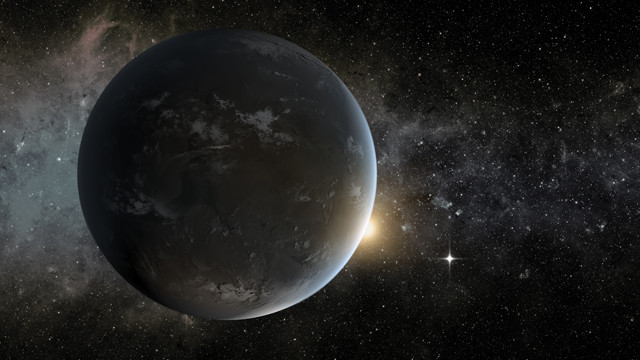
by Timothy Oleson Friday, August 21, 2015

An illustration of Kepler-62f, an exoplanet orbiting within the habitable zone of its local star, Kepler-62, which is thought to be about 70 percent as massive as our sun. Credit: NASA Ames/JPL-Caltech.
Earth is “Exhibit A” in showing that planetary rotation — which moderates global climate, keeps a lot of water in liquid form and generally makes the place more livable — is a plus when it comes to sustaining life. But scientists have thought that many of the rocky, Earth-like exoplanets discovered recently, which might otherwise be considered potentially hospitable to life, aren’t so fortunate. On these unlucky worlds, unable to rotate because they’re held too tightly by their parent stars’ gravity, one half of the planet is perpetually roasted by stellar radiation while the other is left frigid and dark. Now, however, a new study suggests that a little atmosphere can go a long way toward helping exoplanets rotate.
Earlier calculations had suggested that an extremely thick atmosphere — something similar to Venus’, which is roughly 90 times denser at its surface than Earth’s — would be necessary for tightly held exoplanets to rotate with the help of so-called thermal atmospheric tides. As heat from a star warms a nearby planet, the gases in the planet’s atmosphere are distributed unevenly, much as lunar tides affect Earth’s oceans. This uneven distribution modulates the star’s gravitational pull on the planet and can induce rotation if the effect is large enough — that is, if the atmosphere is thick enough.
Jérémy Leconte, a postdoctoral fellow at the University of Toronto, and his colleagues used a 3-D global climate model developed for exoplanets to predict how much a planet’s atmosphere can affect its rotation — an improved approach over the “simple scaling arguments” used previously for such predictions and which were largely based on observations of Venus, the team wrote in Science. The researchers reported that, for exoplanets orbiting “low-mass” stars with roughly 50 to 70 percent of the sun’s mass, an atmosphere similar to Earth’s should be enough to set a planet spinning. The finding could impact the perceived habitability of some exoplanets, considering Earth-like atmospheres “are a reasonable expectation” on these worlds, they noted. Earth-like atmosphere enough to set some exoplanets spinning
© 2008-2021. All rights reserved. Any copying, redistribution or retransmission of any of the contents of this service without the expressed written permission of the American Geosciences Institute is expressly prohibited. Click here for all copyright requests.